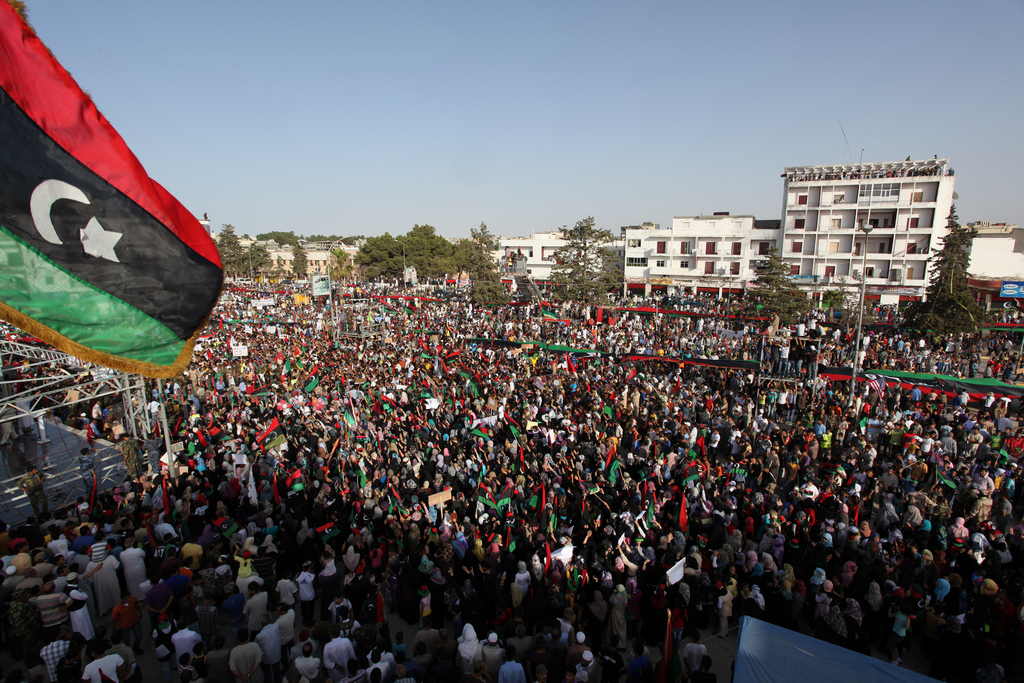
Last week, the Armenian Genocide received its thirtieth recognition from a member of the international community. On April 19, the Libyan Council of Ministers adopted a resolution recognizing the 1915 extermination of Ottoman Armenians as Genocide. The Interim Government is expected to present a draft resolution on the commemoration of the Genocide for the 24th of April.
This announcement seems to have come out of left field. Unlike Lebanon and Syria, both of which had significant and influential Armenian communities established by survivors, Libya, now the third Arab country to recognize the Armenian Genocide, has virtually no Armenian population to speak of. The ANCA does not focus its lobbying efforts on Tripoli, nor does Libya count Armenia as an important trade partner.
Though it is conceivable that this parliamentary motion was motivated by the Libyan people’s sincere desire to bring recognition to historical injustice, a closer look at the parliament which implemented this resolution suggests that the decision is a result of strategic geopolitical considerations.
Libya is governed by not one, but two parliaments, legislating two distinct governments: the Government of National Accord (GNA) based in the capital of Tripoli and the Tobruk-based House of Representatives (HoR). Both entities claim to be the legitimate government of Libya, but the GNA in Tripoli enjoys diplomatic recognition from most of the international community. The Genocide Resolution came from the House of Representatives in Tobruk, not the government in Tripoli.
In February of 2011, amid the Arab Spring, protests in the eastern city of Benghazi culminated in the Libyan Revolution, eventually reaching the capital of Tripoli and toppling Muammar Gaddafi’s regime. The revolutionaries would set up a provisional government backed by the UN known as the National Transitional Council (NTC). The NTC would give way to the Government of National Accord (GNA) following the first election to take place after Gaddafi’s fall in 2012. Despite the vote being declared free and fair, infighting between the various political factions and the government’s inability to stabilize the volatile security situation in the country would lead to a second Libyan Civil War which continues to this day.
Following the refusal of Islamist parties to cede power after losing the June 2014 elections, a rival governing body, the House of Representatives, would be set up in Tobruk. Despite the incredibly complex system of alliances, tribal rivalries and the presence of the Islamic State, the Tobruk government received the support of the Libyan National Army (LNA) and the crucial backing of the influential general, Khalifa Haftar.
Analysts interpret Turkey’s actions within the context of a creeping proxy war…
Turkey has since emerged as one of the GNA’s staunchest supporters during the civil war. In the beginning, Turkish President (then-Prime Minister) Tayyip Erdogan voiced his opposition to the NATO mission in Libya (back in 2011). But with the Islamist takeover of the Tripoli government, Turkey changed its tune. Turkish ships loaded with military and technical supplies bound for Tripoli are routinely intercepted in the Mediterranean.
Analysts interpret Turkey’s actions within the context of a creeping proxy war, pitting the Turkish and Qatari-backed GNA in Tripoli against the Emirati and Egyptian-supported Tobruk government. Turkey’s continued support of the Tripoli government has proven to be a source of considerable resentment for the HoR. General Haftar has threatened airstrikes against any Turkish cargo ships suspected of carrying weapons in Libyan waters.
In light of this context, the House of Representatives’ decision to recognize the Armenian Genocide can be interpreted as a political maneuver to punish Turkey’s meddling. The fact that the motion was first suggested by Abdelhady Alhweij, the Interim Government’s Foreign Minister, points to a diplomatic effort to isolate Turkey. Such a pragmatic motive may not be all that different from the rationale which pushed embattled Syrian President Bashar Al Assad to recognize the Genocide at the height of his own country’s civil war.
Unfortunately for Armenians excited by news of Libya’s resolution, the House of Representatives’ unclear international recognition has cast some doubt on the legal validity of its Genocide motion. However, that may soon be of trivial importance. Over the last four years, General Haftar’s Libyan National Army has managed to capture most of the country in the name of the HoR, leaving the GNA with a rump state around the coastal cities of Tripoli and Misrata.
Earlier this month, the Haftar’s forces launched an assault on the capital of Tripoli. At the time of this writing, the city is expected to fall within weeks.
Predicting Libya’s complex political and security environment after GNA rule might be a fool’s errand. However, in the event of a reunification of the country under General Haftar’s patronage, it is likely that the parliamentary motions passed by the HoR in Tobruk would pass into law once parliament reconvenes in Tripoli.


Your statement that “the HOR lacks international recognition”, is not correct. The international community recognises the Presidential Council in Tripoli and the Parliament of Tobruk (the elected HOR).
Obama made a mistake by intervening in Libya. It basically became his Iraq. Should’ve let the Libyans overthrow Qaddafi on their own.
There is a petition for U.S. president Donald Trump to recognize the Armenian Genocide here: https://petitions.whitehouse.gov/petition/recognize-armenian-genocide-and-pontic-greek-genocide-orchestrated-ottoman-empire-and-turkey-1915-1923
It needs 100,000 signatures in 30 days. Please spread the word.